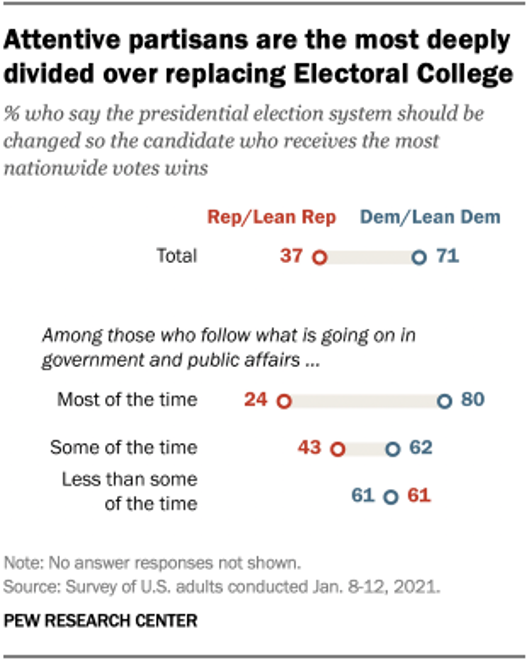Has the Electoral College Overstayed Its Welcome?
I’m not built to embrace voter apathy, but I increasingly understand it. When a person can be elected president while losing the popular vote, who wouldn’t lose faith in the system?

What is the process?
The election of the president and the vice president of the United States is an indirect election in which citizens of the United States who are registered to vote in one of the fifty U.S. states or in Washington, D.C., cast ballots not directly for those offices, but instead for members of the Electoral College. These electors then cast direct votes, known as electoral votes, for president, and for vice president. The candidate who receives an absolute majority of electoral votes (at least 270 out of 538, since the Twenty-Third Amendment granted voting rights to citizens of D.C.) is then elected to that office. If no candidate receives an absolute majority of the votes for president, the House of Representatives elects the president; likewise if no one receives an absolute majority of the votes for vice president, then the Senate elects the vice president. (Wikipedia)
Bottomline: The President of the United States is elected or selected by 538 Presidential electors known as the Electoral College. In some cases, they have voted against the popular vote. When they do that, they are called Faithless electors. Does anyone else see a problem with all of this?
The reason the framers of the U.S. Constitution created this process was a compromise between large and small states. And despite all the reasons to justify this arrangement, it seemed to be motivated by power and control: Among their concerns were that the popular vote could be easily swayed, the desire to give smaller states more power than their populations would provide, and fear that some voters weren’t smart enough to properly choose a president.
When presidents are not elected by the people; what are we really doing?
Smaller states are smaller. That means fewer people, but those people are individuals. Why is the voting lens even about states rather than the individuals who make up the states? If we stopped framing the presidential elections as state competitions, we might look at this country as the United States----of individuals. We could then take the leap to respect the wishes of every voter.
As for having trust that the people will choose properly; why not require candidates to work harder than a soundbite to make the case of their worth and qualifications?
I see the electoral college as a classic example of giving disproportionate power to the few, not the many. And making campaigning too easy. Candidates can design campaigns according to state leanings which require less effort than courting individuals for their support.
The Brookings Metropolitan Policy Program study found that 15 percent of American counties generate 64 percent of America’s gross domestic product. Most of the country’s economic activity is on the East Coast, West Coast, and a few metropolitan areas in between. The prosperous parts of the country are made up of about 15 states with 30 senators. The less prosperous areas are 35 states with 70 senators. The smaller states have a disproportionate voice in the election of a president. This could normalize the election of presidents who lose the popular vote. If this is the trend; why are we voting?
According to the Pew Research Center, “The Electoral College has played an outsize role in several elections in recent memory, and a majority of Americans would welcome a change to the way presidents are elected.
“Prior to the 2020 election, many observers noted that – if Donald Trump were to win – his most likely path toward victory would involve him winning the Electoral College while losing the popular vote (as was the case in 2016). This did not happen, but the current political geography of the United States continues to allow for the possibility that the winner of the popular vote may not be able to secure enough Electoral College votes to win the office.” (Bradley Jones, a former senior researcher focusing on politics at Pew Research Center).
Not surprisingly, support for the Electoral College falls along party lines:

I’m not a political analyst. I’m someone who has worked in a few campaigns and for elected officials. I see the Electoral College as an obstacle to faith in our presidential elections, a formula for voter apathy, and a tool that can be used to nullify the will of the people.
I believe that in a perfect world, candidates, and parties unable to garner support of the majority of individuals by successfully representing their wishes, would never be elected.
